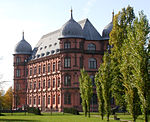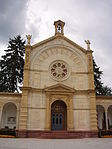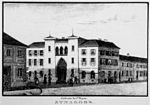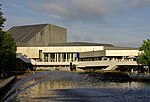Telecooperation Office
Karlsruhe Institute of TechnologyUbiquitous computing
The Telecooperation Office (TECO) is a research group at the Karlsruhe Institute of Technology in Karlsruhe, Germany. The research group is in the Institute of Telematics, and is attached to the Chair for Pervasive Computing Systems, currently held by Michael Beigl.
Excerpt from the Wikipedia article Telecooperation Office (License: CC BY-SA 3.0, Authors).Telecooperation Office
Vincenz-Prießnitz-Straße, Karlsruhe Oststadt
Geographical coordinates (GPS) Address Nearby Places Show on map
Geographical coordinates (GPS)
| Latitude | Longitude |
|---|---|
| N 49.01372 ° | E 8.42421 ° |
Address
Vincenz-Prießnitz-Straße 3
76131 Karlsruhe, Oststadt
Baden-Württemberg, Germany
Open on Google Maps









